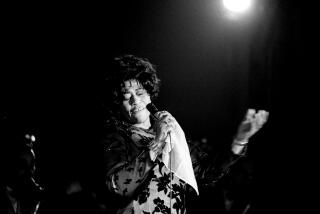Wind-Powered
- Share via
As the story goes, Duke Ellington, Woody Herman and the Modern Jazz Quartet’s John Lewis were sitting backstage at the 1970 Monterey Jazz Festival discussing the previous night’s opening act, a skinny guy dressed in bell-bottoms and a headband who played pop-oriented instrumentals on flute. The question before them: Was that flutist--Tim Weisberg--playing jazz?
“I don’t know if it’s jazz,” Ellington is reputed to have said, “but it’s melodic, and I love it.”
Fans have long discussed whether Weisberg plays jazz or pop or something else. Whatever his music has been called, they, like Ellington, have liked it.
A pioneer in the contemporary jazz field, Weisberg earned a broad following of both jazz and pop fans from the time his first album, “Tim Weisberg,” was released on A&M; Records in 1971. His audience grew with subsequent releases, peaking with his 1978 platinum-selling collaboration with singer-songwriter Dan Fogelberg, “Twin Sons of Different Mothers.” Appearances with such ‘70s rock acts as Loggins & Messina and Jefferson Starship broadened his appeal.
But in recent years, Weisberg, who plays Friday at the Coach House, has had a lower profile, both on stage and in record racks. In a phone conversation from his home in Manhattan Beach, the jovial 54-year-old flutist said he’s been there all along, performing and making records, though without the strong presence he had in the ‘70s.
He agrees that that problem of how to label his recordings has hurt his exposure.
“From the day you make your first album, you’re going to be categorized,” he said, “and there’s nothing wrong with that. It’s a necessary evil. In the ‘70s, they had a heck of a time with me. I wasn’t a bebopper; I didn’t play straight rock ‘n’ roll. Not until the term ‘new age’ was coined in the ‘80s did I have a category.”
Now, with the label “smooth jazz” best defining Weisberg’s work, he hopes to move back into the foreground of the jazz-fusion picture. His 1997 release, “Undercover”(his second from the Denver-based Fahrenheit label), is a beat-minded collection of cover tunes ranging from George and Ira Gershwin’s “Summertime” to Van Morrison’s “Moondance” (with a guest vocal from Kenny Rankin) that’s being played on smooth-jazz stations around the country.
The idea came from an old friend, pianist and “Undercover” co-producer David Benoit.
“It was David who said ‘Why don’t you do a bunch of tunes you’ve played live but never recorded?’ I must have gone through some 300 albums looking for tunes,” Weisberg said.
The collection reflects his eclectic tastes. Included are the pop standard “Someone to Watch Over Me,” Claude Debussy’s “Reverie,” Los Angeles-based composer and bandleader Gerald Wilson’s Spanish-flavored “Viva Tirado” and Herbie Mann’s signature tune (written by Ben Tucker and Bob Dorough) “Comin’ Home Baby.”
“Comin’ Home Baby” was the first time Weisberg heard improvisational flute.
“I asked my classical teacher what it was. He said it was jazz. I asked him how I could play it. He said he didn’t exactly know.”
The album’s only original piece--a tribute to Herbie Hancock dubbed “Herbie’s Blues,” which Weisberg wrote with Benoit--captures the 1960s jazz-funk sound that Weisberg heard as a teenager.
“I always loved the groove of Herbie’s ‘Watermelon Man’ and wanted to do it or something like it. We were in the studio, and [Benoit] started plunking out rhythms on piano, and I joined in on flute. We had the tune written in five or six minutes.”
*
In another departure from previous Weisberg recordings, “Undercover” was recorded live, with minimum electronics and overdubbing. “About 95% of what you hear is the way it went down. We didn’t use click tracks, drum machines or sequencers. We used live human beings.
“In the ‘70s, I think we all got seduced by the technology. . . . But it took us away from the emotion in the music. That’s what it boils down to: emotion and being moved. That’s what I want when I see a performance.”
Weisberg, who’s released about 20 albums over the years, hopes to be more active in 1998.
“I love playing live. That’s how I got started, playing [around Los Angeles] at the Ash Grove, the Troubadour, opening for rock bands at the Greek. The audience treats you like some kind of prize, and it’s like going to your own birthday party every night. That’s an exciting prospect.”
* Tim Weisberg plays Friday at the Coach House, 33157 Camino Capistrano, San Juan Capistrano. 8 p.m. $13.50-$15.50. (714) 496-8927.
More to Read
The biggest entertainment stories
Get our big stories about Hollywood, film, television, music, arts, culture and more right in your inbox as soon as they publish.
You may occasionally receive promotional content from the Los Angeles Times.







